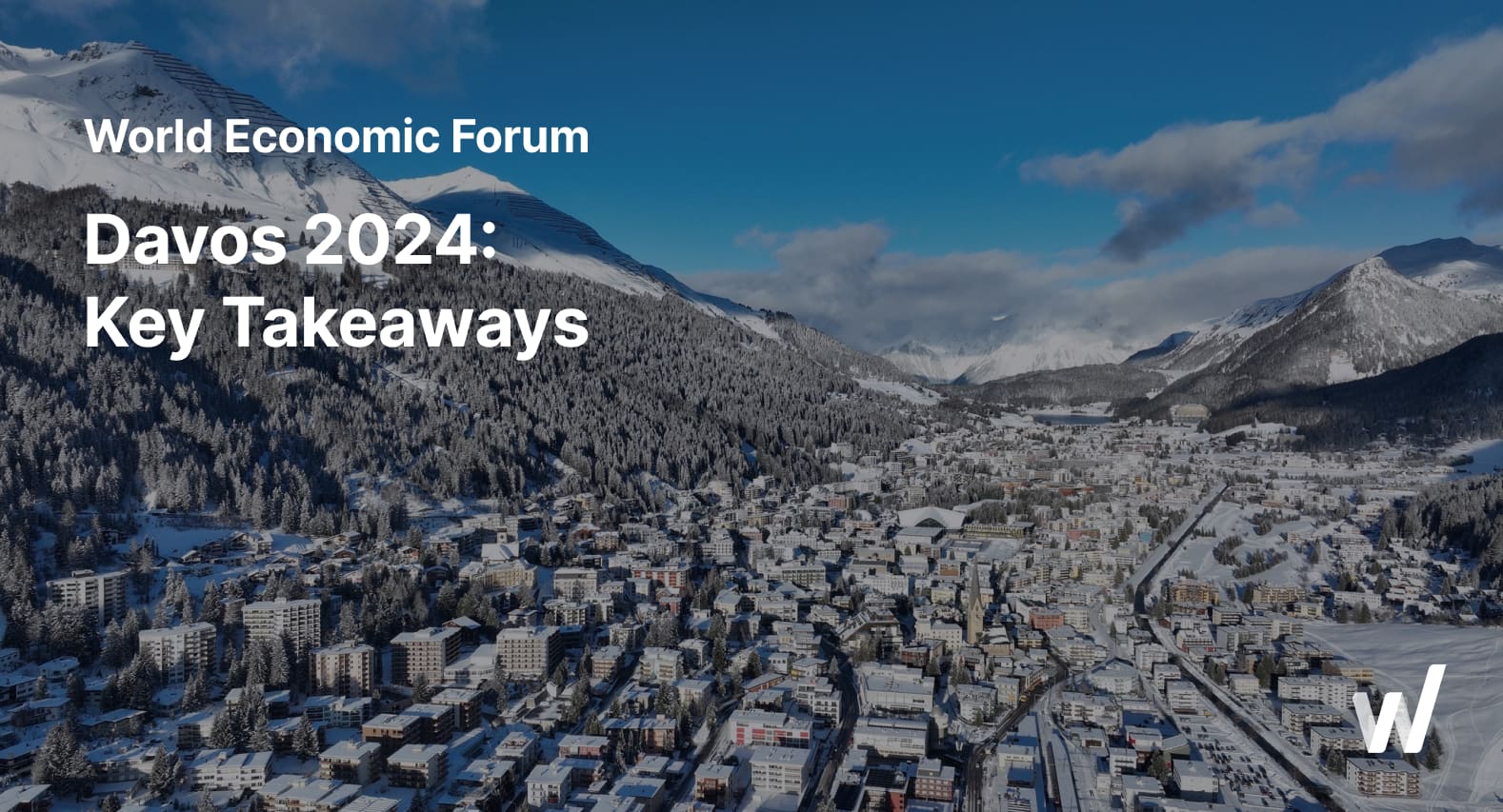From Davos 2024 with Trust: 6 Key Takeaways
The WEF 2024 meeting in Davos tackled trust, AI, climate, private credit, and the future of energy, health, and global finance.

The World Economic Forum held its 54th Annual Meeting from 15-19 January in Davos-Klosters, Switzerland, with 3,000 participants from around the globe. This year's theme is "Rebuilding Trust", and the meeting provided an important space to focus on the fundamental principles that underpin trust, including transparency, consistency and accountability. This is the first meeting without any COVID-related restrictions since 2020.
Organization and meeting history
The World Economic Forum (WEF) was founded in 1971 by Klaus Schwab, a professor of economics at the University of Geneva. Its first name was the European Management Forum. It was conceived as a platform for European companies to discuss business strategies. In the late 1970s, the Forum broadened its focus to include global economic and social issues and was renamed the World Economic Forum in 1987.
The WEF's annual meetings in Davos, Switzerland, became famous for gathering global leaders from various sectors, including business, government, and civil society, to address pressing world issues and foster collaborative solutions. The forum has played a key role in shaping global, regional, and industry agendas, and its influence has grown to encompass a wide range of activities, including numerous initiatives and projects aimed at improving the state of the world.
Agenda
The theme was "Rebuilding Trust". This theme is particularly relevant today when global challenges have often led to fragmented responses and eroded public trust in institutions. The content of the meeting was divided into four key themes:
- Achieving security and cooperation in a fractured world
- Creating growth and jobs for a new era
- Artificial intelligence as an economic and social driver
- A long-term strategy for climate, nature and energy
In addition to the seemingly endless supply of shocks, culminating in the tragic violence in the Middle East, the world needs practical solutions because of profound structural changes, from geo-economics to climate change to artificial intelligence. The meeting focused on restoring trust at three fundamental levels: in the future, within societies and between nations.
Key takeaways
There were +450 conference sessions at the annual meeting. In case you missed those sessions, we have gathered six key takeaway points from the 54th Annual Meeting of WEF.
Generative AI and its future
There is an enormous potential of Generative AI, but it comes along with the challenges it poses. Within the talks on AI, Sam Altman, CEO of OpenAI, was referenced in nearly every session. Altman highlighted the transformative yet uncertain future of the technology. Sessions discussed the impact of AI on industries, labour markets and the spread of misinformation. The European Union's AI regulations and Microsoft CEO Satya Nadella's call for balanced technological progress highlighted the global urgency for responsible AI governance.
Energy security and green future
Interest in energy security and a green future has largely shifted to decarbonisation and its complexities. [The end of 'free money'](https://www.weforum.org/agenda/2024/01/future-of-finance-at-davos-2024-5-things-i-learned/#:~:text=The end of free money and energy security have profoundly changed the investment narrative. For instance%2C last year the global clean energy index (ICLN) was down 21%25%2C while the S%26P was up 24%25 and Nasdaq 55%25. And this year it has fallen further%2C down almost 12%25 while the S%26P is up 1.5%25.) and shifts in energy security have led to significant changes in the investment narrative, particularly in clean energy and infrastructure projects. The focus has shifted from simply reducing emissions to financing emissions reductions, with private equity playing a key role. Despite geopolitical challenges and policy constraints, interest in financing climate action remains strong, recognising the inherent volatility and complexity of the transition from fossil fuels to renewables.
Climate change and health correlation
The link between climate change and public health is an urgent issue that needs to be addressed. Brazil's Minister of Health, Nisia Trindade Lima, outlined concerns such as waterborne diseases and the impact of climate stressors on mental health. Partnerships across sectors, including digital public infrastructure, are essential to address these challenges effectively. These partnerships, which combine public frameworks with private sector innovation, are critical to ensuring accessibility and security for all.
Private credit shifting
Regulatory changes and evolving financial market dynamics are increasing the speed of the shift from traditional banking to private credit. Key factors include proposed increases in bank capital requirements, which will affect the ability to finance sectors such as renewable energy and drive SMEs to seek alternative sources of finance. The private lending market, which is attractive for its rates of return, is expected to grow significantly, although there are concerns about market volatility and the financial strategies of smaller players. This transition marks a significant change in credit intermediation structure, reshaping how businesses and projects are financed globally.
Demand for taxation of extreme wealth
A group of billionaires and millionaires have published a letter demanding that elected leaders tax their extreme wealth. The letter has hundreds of signatures, including Richard Curtis, Abigail Disney, Valeria Rockefeller and others. The letter was published as part of the 'Proud to Pay More' campaign, which argues for higher taxes on the wealthy. They argued that such taxation would not significantly affect their living standards but would contribute to a fairer and more democratic future.
Economic optimism is here
Wars, upcoming elections, etc. Despite this, 44% of the Chief Economists Outlook 2024 survey respondents said they did not expect the global economy to slow this year. There is cautious optimism in Davos about the global economic outlook, considering factors such as inflation rates, economic recovery and the resilience of financial markets.
Subsribe to our weekly newsletter
Get our Sunday morning newsletter with exclusive deals, portfolio updates, and private market insights delivered straight to your inbox.



.jpg)
